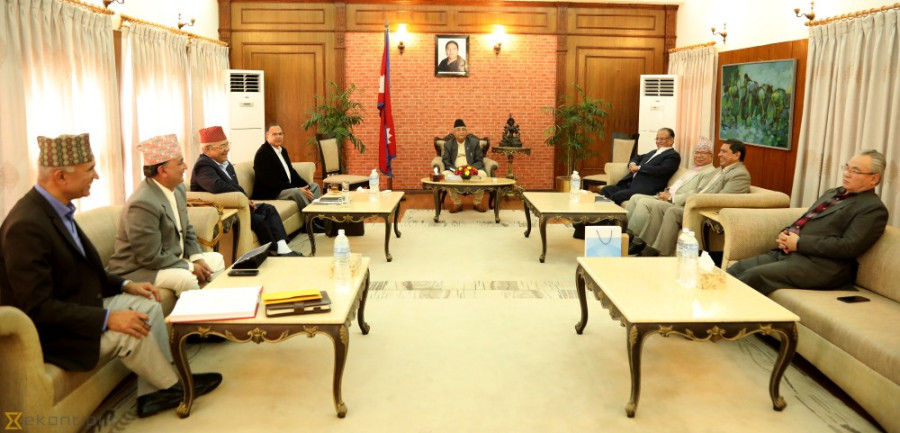Politics
Ruling party holds hours-long discussion to build a concrete position on Indo-Pacific Strategy
This is the first meeting to build a firm position on the strategy and how the ruling party should progress in the future, party leaders say.
Anil Giri
As the debate over whether Nepal is part of the Indo-Pacific Strategy continues, the ruling Nepal Communist Party has been holding internal consultations to build a position on the Washington-led initiative, just ahead of a joint training with the Communist Party of China.
Multiple leaders told the Post that NCP’s foreign affairs department held a closed-door “consultation and brainstorming” session on Thursday among its top leaders and some analysts at the party headquarters in Paris Danda for almost four hours.
The meeting was attended by senior party leaders, including former prime minister and head of the international department Madhav Kumar Nepal, party spokesperson Narayan Kaji Shrestha, leaders Bhim Rawal, Dipak Prakash Bhatta and Bishnu Rijal. According to party leaders familiar with the participants of the closed-door session, Prof Shreedhar Khatri, former Chief of Army Staff Gaurav Shumsher Rana, former foreign policy adviser to former Prime Minister Jhala Nath Khanal Milan Tuladhar, conflict expert Bishnu Raj Uprety, political commentator Tika Dhakal and Yadav Sharma, a long-time member of the party’s international department, also attended Thursday’s meeting.
“The gathering was a kind of brainstorming session as the Indo-Pacific Strategy has become a heated foreign policy issue and we thought that the party needs a position on it,” Rijal, the deputy chief of the party’s international department, told the Post.
With a Nepal visit by Chinese President Xi Jinping in the works and a planned training session with the Communist Party of China on Xi Jinping Thought, the discussion on the Indo-Pacific Strategy was a necessity, leaders in the party told the Post. Two separate memoranda of understanding will be signed between the Nepal Communist Party and the Chinese Communist Party at the end of the two-day session titled the ‘Nepal-China Friendship Symposium’.
Nepal’s inclusion in the US-led global initiative made headlines after the visit of Foreign Minister Pradeep Gyawali to Washington in December last year. US officials had announced that Nepal plays a central role in a free and open Indo-Pacific region. While many see the strategy as an attempt to “contain China”, the US has consistently maintained that the strategy is not aimed at any country in particular and is simply a ‘policy’, not a ‘strategy.’
“It was an internal deliberation where we discussed many aspects of the Indo-Pacific Strategy, the ongoing trade war between the US and China, the role of China in the South China Sea, and US assistance to Nepal for Millennium Challenge Corporation,” Tuladhar said.
During the session, Khatri, a foreign policy analyst, made a presentation on the Indo-Pacific Strategy and its possible implications for Nepal and the region.
“Most experts suggested that Nepal should not be part of any kind of military alliance. But we can embrace parts of its economic aspects and other facets of cooperation like trade and commerce,” said Tuladhar.
While some suggested caution while dealing with any alliance, others urged leaders to take part in the strategy and take advantage. Nepal cannot afford to sit out a strategic military alliance as a small country, said one leader who took part in the discussions and spoke on condition of anonymity.
Opinions are divided in Kathmandu over the US-led strategy. During a recent meeting with Chinese Foreign Minister Wang Yi in Kathmandu, Co-chair of the ruling party Pushpa Kamal Dahal had said that Nepal “disapproves” of the Indo-Pacific Strategy, according to a statement by the Chinese Foreign Ministry. The comment had created a storm in Kathmandu’s diplomatic sphere, with the US Embassy in Kathmandu asking for clarification from the Ministry of Foreign Affairs.
Last week, Clinton S Brown, the head of the political section at the US Embassy in Kathmandu, said the Indo-Pacific Strategy is not a strategy but a policy.
“When we talk about the Indo-Pacific Strategy, there is no club that people sign up for—it is our own policy,” Brown said. “It is what we do to help ensure the international system, and the Indo-Pacific region specifically, remains governed by the rule of law, by openness, by freedom, and by security.”
Brown, during a programme, said those who frame the strategy as some kind of secret anti-China plan must be unaware of history. “They either do not know—or are pretending not to know—that US behaviour to secure a free and open Indo-Pacific region for the last 70 years is what made it possible for hundreds of millions of people, most of them Chinese Communists, to rise out of poverty.”
Many in Nepal’s political sphere, however, remain unconvinced, with opinions divided within the ruling party itself.
“We will hold more discussions with a broader section of stakeholders to build a firm opinion,” said Rijal. “And then we can decide how the party should present itself in the future when such ambitious initiatives create friction.”
***
What do you think?
Dear reader, we’d like to hear from you. We regularly publish letters to the editor on contemporary issues or direct responses to something the Post has recently published. Please send your letters to [email protected] with "Letter to the Editor" in the subject line. Please include your name, location, and a contact address so one of our editors can reach out to you.




 13.12°C Kathmandu
13.12°C Kathmandu














